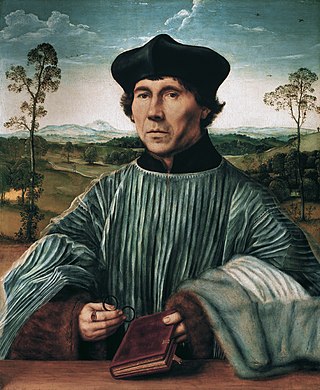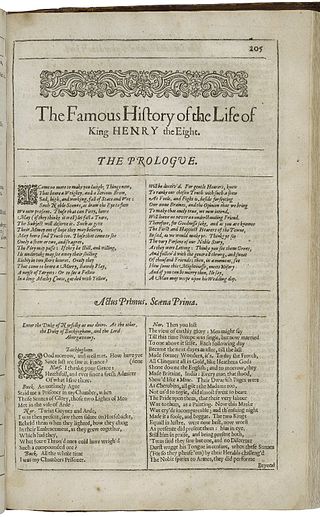Related Research Articles

Henry VIII was King of England from 22 April 1509 until his death in 1547. Henry is best known for his six marriages, and his efforts to have his first marriage annulled. His disagreement with Pope Clement VII about such an annulment led Henry to initiate the English Reformation, separating the Church of England from papal authority. He appointed himself Supreme Head of the Church of England and dissolved convents and monasteries, for which he was excommunicated by the pope.

Anne Boleyn was Queen of England from 1533 to 1536, as the second wife of King Henry VIII. The circumstances of her marriage and of her execution by beheading for treason and other charges made her a key figure in the political and religious upheaval that marked the start of the English Reformation.

Reginald Pole was an English cardinal of the Catholic Church and the last Catholic archbishop of Canterbury, holding the office from 1556 to 1558, during the Counter-Reformation.
The Six Wives of Henry VIII is a series of six television plays produced by the BBC and first transmitted between 1 January and 5 February 1970. The series later aired in the United States on CBS from 1 August to 5 September 1971 with narration added by Anthony Quayle. The series was rebroadcast in the United States without commercials on PBS as part of its Masterpiece Theatre series.

Jasper Tudor, Duke of Bedford, was an Anglo-Welsh nobleman. He was the uncle of King Henry VII of England and a leading architect of his nephew's successful accession to the throne in 1485. He was from the noble Tudor family of Penmynydd in North Wales.

Stephen Gardiner was an English Catholic bishop and politician during the English Reformation period who served as Lord Chancellor during the reign of Queen Mary I and King Philip.

The First Succession Act of Henry VIII's reign was passed by the Parliament of England in March 1534. The Act was formally titled the Succession to the Crown Act 1533, or the Act of Succession 1533; it is often dated as 1534, as it was passed in that calendar year. However, the legal calendar in use at that time dated the beginning of the year as March 25, and so considered the Act as being in 1533.

Thomas Wriothesley, 1st Earl of Southampton, KG was an English peer, secretary of state, Lord Chancellor and Lord High Admiral. A naturally skilled but unscrupulous and devious politician who changed with the times, Wriothesley served as a loyal instrument of King Henry VIII in the latter's break with the Catholic church. Richly rewarded with royal gains from the Dissolution of the Monasteries, he nevertheless prosecuted Calvinists and other Protestants when political winds changed.

Henry VIII is a collaborative history play, written by William Shakespeare and John Fletcher, based on the life of Henry VIII. An alternative title, All Is True, is recorded in contemporary documents, with the title Henry VIII not appearing until the play's publication in the First Folio of 1623. Stylistic evidence indicates that individual scenes were written by either Shakespeare or his collaborator and successor, John Fletcher. It is also somewhat characteristic of the late romances in its structure. It is noted for having more stage directions than any of Shakespeare's other plays.

Rowland Taylor was an English Protestant martyr during the Marian Persecutions.
Thomas Watson was a Catholic Bishop, notable among Catholics for his descriptions of the Protestant Reformation. Historian Albert Pollard described Watson as "one of the chief Catholic controversialists" of Mary Tudor's reign.

Katherine Brandon, Duchess of Suffolk, suo jure12th Baroness Willoughby de Eresby, was an English noblewoman living at the courts of King Henry VIII, King Edward VI and Queen Elizabeth I. She was the fourth wife of Charles Brandon, 1st Duke of Suffolk, who acted as her legal guardian during his third marriage to Henry VIII's sister Mary. Her second husband was Richard Bertie, a member of her household. Following Charles Brandon's death in 1545, it was rumoured that King Henry had considered marrying Katherine as his seventh wife, while he was still married to his sixth wife, Catherine Parr, who was Katherine's close friend.
Mary Seymour, born at her father’s country seat, Sudeley Castle in Gloucestershire, was the only daughter of Thomas Seymour, 1st Baron Seymour of Sudeley, and the dowager queen, Catherine Parr, widow of Henry VIII. Although Catherine was married four times, Mary was her only child. Complications from Mary's birth would claim the life of her mother on 5 September 1548, and her father was executed less than a year later for treason against her cousin Edward VI.

The Six Wives of Henry VIII is a 2001 television documentary series about the wives of King Henry VIII presented by historian David Starkey from historic locations with added re-enactments.
Events from the 1520s in England.
Anne Boleyn is a play on the life of Anne Boleyn by the English author Howard Brenton, which premiered at Shakespeare's Globe in 2010. Anne Boleyn is portrayed as a significant force in the political and religious in-fighting at court and a furtherer of the cause of Protestantism in her enthusiasm for the Tyndale Bible.
Thomas Gardiner, was a monk of Westminster Abbey who wrote a chronicle of English history from Brutus of Britain to the seventh year of Henry VIII, entitled The Flowers of England. The only manuscript, which is among the Cotton MSS., was badly damaged by fire. He also wrote a genealogical roll of Tudor ancestry.
John London, DCL was Warden of New College, Oxford, and a prominent figure in the Dissolution of the Monasteries during the reign of Henry VIII of England.
Edmund Steward otherwise Stewart or Stewarde was an English lawyer and clergyman who served as Chancellor and later Dean of Winchester Cathedral until his removal in 1559.
Evening Hymn, "Te lucis ante terminum", is an anthem composed by Henry Balfour Gardiner, a setting of the Latin compline hymn "Te lucis ante terminum" for four voices and organ, in both English and Latin. It was published in 1908. It is regarded as Gardiner's best-known work and a classic of the English choral tradition.
References
- ↑ Ferriby, David (2015). The Tudors: England 1485 - 1603. London: Hodder Education. p. 77. ISBN 978-1-4718-3758-6.
- ↑ Letters and Papers of the Reign of Henry VIII, ed. James Gairdner. Vol. X, no. 276.